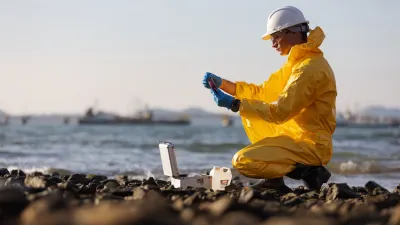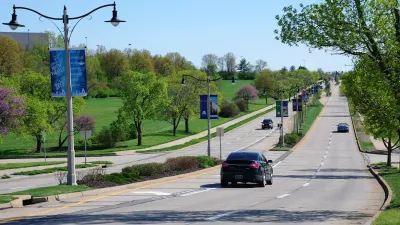Land use, housing location, and the "everyday decisions" of planners are the backbone of a new way of looking at climate change policy, according to this article from the Los Angeles Times.
From the Los Angeles Times:
"You can still do something to fight global warming: Live closer to work."
"That's one conclusion of a major national report published Thursday by the nonprofit Urban Land Institute."
"Forty percent of the planet-heating gases that Californians emit come from transportation, according to the report's authors, and with its booming population and sprawling suburbs, the state's greenhouse emissions will continue to soar unless it dramatically changes the way it builds cities and suburbs."
"Up to now, climate policy has primarily focused on such things as higher fuel economy for cars and trucks, cleaner fuels, greener building standards, lower power plant emissions, and international treaties. But a growing consensus of experts is also homing in on the everyday zoning decisions of local officials and county planners."
Economist Peter Gordon offers a counterpoint on his blog:
"Socialism collapsed but climate change arrived just in time to save social engineering. So there are now many suggestions on how to redesign our cities and our lives."
"The social engineering is obvious: Move jobs out of the downtowns and into the suburbs."
"Not actually. We live in a world of trade-offs and must think about the costs. Social engineers cannot do this very well and this is why socialism collapsed and why we look to markets to do what committees of wise men and women cannot."
FULL STORY: To go green, live closer to work, report says

Planetizen Federal Action Tracker
A weekly monitor of how Trump’s orders and actions are impacting planners and planning in America.

USGS Water Science Centers Targeted for Closure
If their work is suspended, states could lose a valuable resource for monitoring, understanding, and managing water resources.

End Human Sacrifices to the Demanding Gods of Automobile Dependency and Sprawl
The U.S. has much higher traffic fatality rates than peer countries due to automobile dependency and sprawl. Better planning can reduce these human sacrifices.

Seattle Transit Asked to Clarify Pet Policy
A major dog park near a new light rail stop is prompting calls to update and clarify rules for bringing pets on Seattle-area transit systems.

Oregon Bill Would End Bans on Manufactured Housing
The bill would prevent new developments from prohibiting mobile homes and modular housing.

Nashville Doesn’t Renew Bike Share Contract, Citing Lost Federal Funding
The city’s bike share system, operated by BCycle, could stop operating if the city doesn’t find a new source of funding.
Urban Design for Planners 1: Software Tools
This six-course series explores essential urban design concepts using open source software and equips planners with the tools they need to participate fully in the urban design process.
Planning for Universal Design
Learn the tools for implementing Universal Design in planning regulations.
Tyler Technologies
New York City School Construction Authority
Village of Glen Ellyn
Transportation Research & Education Center (TREC) at Portland State University
Chaddick Institute at DePaul University
Institute for Housing and Urban Development Studies (IHS)
Regional Transportation Commission of Southern Nevada
Toledo-Lucas County Plan Commissions


























